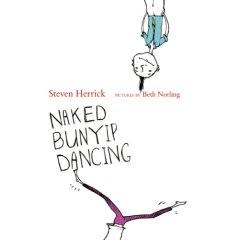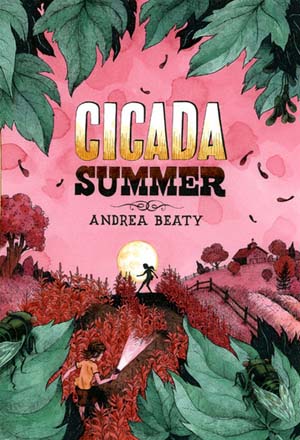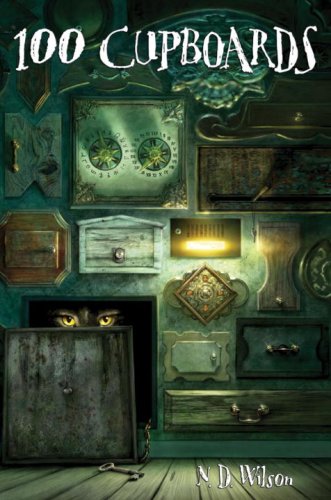100 Naked Summers
 March 19th, 2008 by jules
March 19th, 2008 by jules
That title might be lame, but at least I got your attention, right? That’s a rather pathetic amalgamation of the three titles I’m going to review today. Yup, it’s time for a short round-up of some new middle-grade titles I’ve read recently. Let’s get right to it then…
 First off is Steven Herrick, Australian poet and free verse author, whose books I consistently adore, as I’ve made clear several times here at 7-Imp (see here for a review of The Wolf and here for By the River). Originally published in 2005 by Allen & Unwin, the first U.S. edition of Naked Bunyip Dancing has just been brought to us from Front Street. I know that free verse can be so used and abused that many of our loyal readers perhaps get twitchy when even hearing the phrase, but with Mr. Herrick, you’re in good hands.
First off is Steven Herrick, Australian poet and free verse author, whose books I consistently adore, as I’ve made clear several times here at 7-Imp (see here for a review of The Wolf and here for By the River). Originally published in 2005 by Allen & Unwin, the first U.S. edition of Naked Bunyip Dancing has just been brought to us from Front Street. I know that free verse can be so used and abused that many of our loyal readers perhaps get twitchy when even hearing the phrase, but with Mr. Herrick, you’re in good hands.
This novel chronicles the school year for one Australian classroom 6C, a group of students who are a bit in awe of their unconventional new teacher, Mr. Carey, who has a beard, wears “flared trousers / and beads / and a T-shirt with the slogan / Meat is Murder on the front / and McDonald’s = McJunk on the back.” In his introduction to the class, Mr. Carey plays some Bob Dylan (“who sounds like / he swallowed a bag of marbles / and got two stuck up his nose”). Before the bell rings, Mr. Carey — whom the class has quickly dubbed “Carey, the scary!” and “the bearded beaded one,” though “Carey the hairy” is the name that sticks — tells the class that he hopes they’ll sing together and read some poetry after lunch. Ahem. They’re a bit blindsided by this, but Carey the Hairy quickly wins the adoration and devotion of all the students with his candor and creativity. In no time flat, he’s convinced the students to perform a show to showcase each and every student’s talents — from J-man’s “Class 6C Rap” to Ahmet’s juggling to Sophie’s memorable poetry recitation (“And so I speak, / slowly / and clearly, / and I don’t see / the faces in front of me. / I see the images of my poem, / and I think only of what I’m saying / and how much it means to me”).
Narrating the novel with multiple points-of-view — ranging from Mr. Carey to the students — Herrick brings these students and their teacher into a sharp, affectionate focus with his concise and precise characterizations. There’s a lot of humor here, particularly with Billy the Punk and hapless Jason, who likes Emily but has been talked into dancing in tights for the school performance. But there’s also some intensity, particularly with Alex, whose parents’ separation is taking an emotional toll on him. The classmates are brought to life with Beth Norling’s endearing loose cartoon drawings (pictured here is the Allen & Unwin cover). Fans of Sharon Creech’s Love That Dog and other narratives about students finding their voices — and doing so through the power of poetry — likely will enjoy this one.
And is that not the best title of the year thus far?
 Isn’t it lovely when an author surprises you? Andrea Beaty, who up ’til now has proven to us that The Funny in her is strong (as well as her appreciation of The Funny, what with all her blogging over at Three Silly Chicks), brings us quite the poignant middle-grade novel — Cicada Summer, to be published by Amulet Books (an imprint of Abrams) this May. “Quite the poignant novel”? Okay, I’ll stop being so tough. She had me practically weeping over the book at its close: I had to declare to the people around me that day, now I’m verklempt. Talk amongst yourselves. I’ll give you a topic: The Italian Neo Realist Movement in film was neither Italian nor neo nor particuarly a movement. Discuss! à la Linda Richman.
Isn’t it lovely when an author surprises you? Andrea Beaty, who up ’til now has proven to us that The Funny in her is strong (as well as her appreciation of The Funny, what with all her blogging over at Three Silly Chicks), brings us quite the poignant middle-grade novel — Cicada Summer, to be published by Amulet Books (an imprint of Abrams) this May. “Quite the poignant novel”? Okay, I’ll stop being so tough. She had me practically weeping over the book at its close: I had to declare to the people around me that day, now I’m verklempt. Talk amongst yourselves. I’ll give you a topic: The Italian Neo Realist Movement in film was neither Italian nor neo nor particuarly a movement. Discuss! à la Linda Richman.
This is the story of Lily, a sixth-grader who is on a strikingly successful streak of invisibility:
“Most people would say that’s a lie. They’d say that I’m not invisible because they can see me as plain as day. Most people are wrong. It’s not my skin that makes me invisible. It’s my silence. My silence and the trick I do with my eyes where I never look anybody in the face . . .
It’s been two years, and it’s getting hard to remember when I wasn’t invisible. Sometimes I wonder if I’ll fade so much that I won’t even be able to see myself.”
Something happened with Lily and her now-dead brother, something Lily intends to keep a secret (she’s not spoken a word for these two years) and that has left the town wondering about Lily’s very mental capabilities. Beaty expertly paces this reveal throughout the narrative in such a way that is hardly intrusive (which could have easily happened in the hands of a clumsier author) and in such a way that builds tension and makes the novel a whopper of a page-turner. Indeed, I read this in one day, finding myself not able to put it down, though it says a lot about Beaty’s writing that it’s also the type of novel I want to pick up and read again: She infused the story and characters (Lily, her father, and their elderly friend, Fern, in particular) with such tenderness and warmth, but she also balances it with an impishness in the character of the suddenly-new-to-town lying, stealing Tinny Bridges, who has secrets of her own and whom the Nancy-Drew-loving Lily is both fascinated by and terrified of. Lily has to work hard to stay two steps ahead of the clever, troublesome Tinny, yet it’s Tinny who leads Lily to her moment of redemption in a heart-rending end-of-chapter scene I won’t forget for a long time (and, no, I won’t spoil it for you). This short novel has it all: drama and intrigue (including a bank robbery, the FBI, and “wanted” posters surreptitiously stolen from post offices), vivid characterization, some unforgettable imagery, just the right dose of not-too-heavy-handed symbolism (the cicadas infesting this particular summer in Lily’s life signify more than just a loud buzzing background noise in the town where she lives) — and best of all, a big, throbbing heart at its center and characters you care about. It’s all brought to us like a gift by an author who, lucky for us, knows that — as one of her characters puts it — we don’t always need to see a thing with our eyes or hear it with our ears to believe it.
On bookshelves in May. Note: I read an uncorrected advance proof of this book; quoted excerpts are subject to change.
 And, finally, I must mention N.D. Wilson’s first book in a new fantasy adventure — the portal-to-other-worlds kind — this one entitled 100 Cupboards (Random House; December ’07) — and with such a kickin’ cover that I had to make that image huge.
And, finally, I must mention N.D. Wilson’s first book in a new fantasy adventure — the portal-to-other-worlds kind — this one entitled 100 Cupboards (Random House; December ’07) — and with such a kickin’ cover that I had to make that image huge.
Twelve-year-old Bostonian Henry York finds himself living with his Uncle Frank, his Aunt Dotty, and his cousins — whom he hasn’t seen since the age of four — in an old farmhouse in Henry, Kansas, as his globe-trotting parents have been kidnapped. Henry’s thrilled: He might be living in a tiny room up in the farmhouse attic, once a closet, but he’s finally away from his worrisome, controlling parents (“he had led a life that had taught him not to look forward to anything”). In Kansas, he can play baseball without a helmet and wield a knife. Score!
One night, while Henry’s lying in bed in his mysterious new attic room, a piece of plaster falls from the wall and lands in his hair. Eventually — and with help from his cousin, Henrietta — he discovers under all the plaster, ripped from his wall, ninety-nine odd, little cupboards (well, “little,” except for that one honkin’ big draw there on the cover’s bottom left — the one with those mwhahahahahaha evil eyes. Shudder). “Henry knelt on his bed upstairs and pried plaster off the wall with his knife. His thumb ached.” This is the dramatic end to chapter three, as Henry’s still determinedly prying plaster off his wall and which had me so wrapped around its finger, I couldn’t put the book down.
Through one door, Henry and his cousin hear falling rain. Through another, which glows, they see the legs of a man, walking back and forth. Needless to say, these are the aforementioned portals to another world, one which Henry is anxious to discover. The problem is: Most of the cupboards are locked. Not to mention there’s another mystery to solve — Grandfather’s mysterious bedroom, which hasn’t been opened since he died years ago. Henry must determine if the locked doors and Grandfather’s bedroom, as well as his sometimes cryptic Uncle Frank, are all connected in some way.
I don’t want to spoil the plot for you here, so I’ll be brief. Though the novel gets off to a somewhat slow start, here’s what I loved about this read: The creepy, you-might-not-want-to-read-this-late-at-night tone; the conflicted, complex Henry; the whiff of timelessness that permeates Wilson’s writing and the entire narrative (“whiff” is not very eloquent, I know. It’s late. My apologies to the talented Mr. Wilson, should he actually read this, by some chance); the tension and mystery Wilson builds throughout the tale as well as the tantalizing questions he leaves us with; and the moments of lovely, magical prose of which he is quite capable:
The wind scratched its back along the side of the barn. The stars swung slowly across the roof of this world, and the grass swayed and grew, content to be the world’s carpet but still desiring to be taller.
Ah, loveliness. A welcome new fantasy adventure, and I look forward to volume number two.

I was starting to think I was the only one who had read “Naked Bunyip Dancing” – it’s in my column this month. I thought it was a nice portrayal of an innovative teacher and how school can be fun and interesting – and not so much bullying/mean girls/he hates me/she hates me/on and on hallway drama.
It was a nice change from the standard book set in school in other words!
Man, I want to read ALL THREE of these. I LOVE the Herrick, simply because I do that – I make up names for people, and Bearded and Beaded made me laugh out loud. Also, I love the poignant novel, and I love portals to new worlds. These all sound AWESOME!
I also reviewed Naked Bunyip Dancing, albeit, as a novice YA reader.
The other 2 you’ve reviewed have just been added to my to-read list!
I agree, Colleen! And I forgot to add, everyone, that cover art for Cicada Summer is by John Hendrix, who illustrated Polly Horvath’s most recent novel. He’s good at those covers that call for lots ‘o’ intrigue. I like the cover for that one — well, for all the books today.
Wow, Jules! I am so glad to read your reviews on these books. I already have the third (thanks to Fuse #8), but the first two are new to me.
I love the cover of “Naked Bunyip Dancing,” so I probably would’ve picked that one up at the store. But most likely, after seeing the poetry, I probably would have put it back on the shelf (gasp). I’ll definitely have my local bookstore order me a copy.
As for the second title, “Cicada Summer,” I’ve been seeing images of this book here and there on the blogs. It’s not one that had particularly jumped out for me in the past. Glad I read your review. It sounds like an incredible book. I wonder about Lily and Shusterman’s Schwa, if there’s a natural comparison here. Or, perhaps Adam Farmer from “I Am the Cheese.” Either way, looks like I’ll be ordering this one too.
Thanks for the great recommendations.
Oh, jules, jules, jules. My TBR pile is giving me the evil eye something fierce. But I must have Naked Bunyip Dancing. Must. And a Nancy Drew loving heroine? And not one, but hundreds of secret doors? I am SO in trouble.
I DID read 100 Cupboards late at night. Big mistake. I don’t remember the last time I’ve gotten that creeped out by a book. Anyway, I LOVED it, and I’m so excited for the sequel, and I think I’m going to reread it soon so I can interview the author.
No kidding about the cover for 100 Cupboards. I love it when publishers get those things right.
These all sound great! Gosh dang it, we never did get our copy of 100 Cupboards for the Cybils.
[…] Jules at Seven Impossible Things Before Breakfast: “Beaty expertly paces this reveal throughout the narrative in such a way that is hardly intrusive (which could have easily happened in the hands of a clumsier author) and in such a way that builds tension and makes the novel a whopper of a page-turner.” […]
[…] Seven Impossible Things Before Breakfast […]
Hello. And Bye. 🙂
[…] written above and beyond picture books, too. She’s written for middle-grade readers as well. Here’s my 2008 review of Andrea’s Cicada Summer, a beautiful, poignant read. And she’s back […]